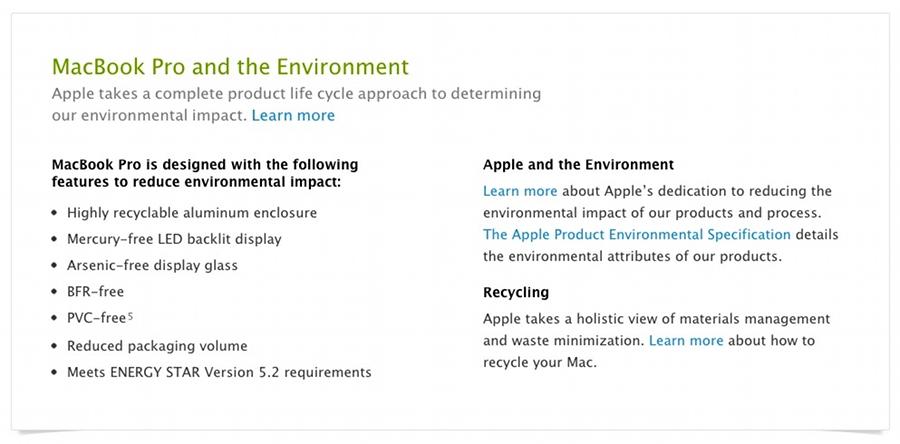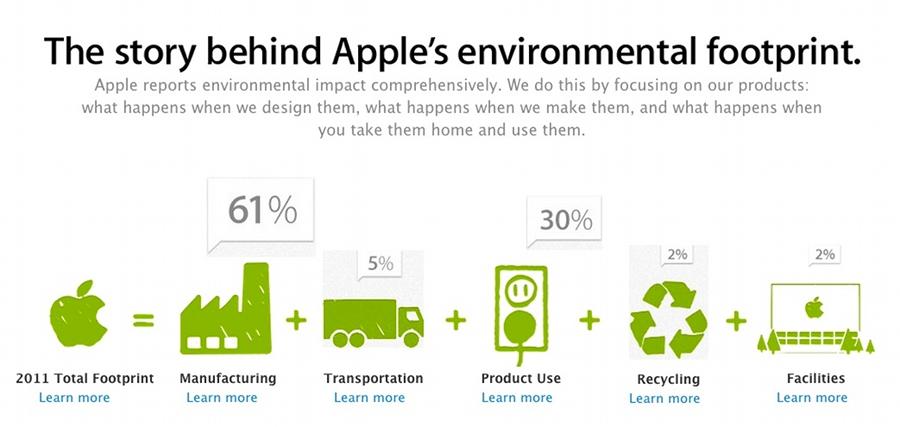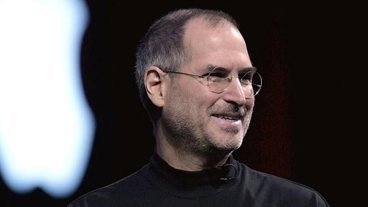Apple pulls products from government-backed 'green electronics' list
In a report from CIO Journal, EPEAT CEO Robert Frisbee said an Apple representative requested that the company's already-cleared products be taken down from the registry which carries a list of electronic devices certified to be recyclable, energy efficient and environmentally friendly.
The Electronic Product Environmental Assessment Tool, or EPEAT, was the result of a U.S. Environmental Protection Agency grant awarded to the Zero Waste Alliance (ZWA) for an electronics environmental assessment program. In 2007 an executive order was issued requiring 95% of all federal agency purchases to be EPEAT-registered products and many manufacturers routinely strive to attain the group's Gold rating.
In order to be certified by EPEAT a product must be easy to disassemble with common tools to have toxic components like batteries separated from recyclable materials. Interestingly Apple was among the manufacturers, advocacy groups and government agencies that helped create the standards.
“[Apple] said their design direction was no longer consistent with the EPEAT requirements,†Frisbee said. “They were important supporters and we are disappointed that they don’t want their products measured by this standard anymore.â€
An Apple spokesperson declined to comment and instead referred inquiries to the company's website which contains information regarding the environmental impact of its products. The company has removed any mention of the EPEAT standard on its product Tech Specs pages but retains ENERGY STAR requirements as well as a string of dedicated environmental awareness pages.
The MacBook Pro with Retina display environmental information no longer mentions the EPEAT standard
and was not submitted for certification. | Source: Apple
In its teardown of the new MacBook Pro with Retina display, iFixit said the laptop is an engineering marvel but is "to date, the least repairable laptop we've taken apart. Apple has packed all of the things we hate into one beautiful little package." The aluminum unibody chassis was not only secured by proprietary pentalobe screws but had soldered-on RAM and a fused display assembly. Perhaps most telling is the construction of the battery pack which is glued to the frame rather than secured by screws. Apple did not submit the laptop for EPEAT review.
“If the battery is glued to the case it means you can’t recycle the case and you can’t recycle the battery,†Frisbee said of the new MacBook Pro with Retina display.
According to Sterne Agee analyst Shaw Wu, Apple had to make the concessions in recyclability to satisfy the growing demand for thinner, more efficient laptops. Some detractors to the newer design choices that limit product repairability claim that the company is purposely making it difficult for users to install third-party upgrades like RAM and hard drives.
“They are not trying to purposely make it hard to open, they are just trying to pack as much as they can into a small space–it’s a design decision,†Wu said.
It remains to be seen whether the quiet removal from EPEAT's list will have any affect on sales, though director of outreach for the standards group Sarah O'Brien said that many large corporations require computer purchases to be EPEAT-certified. A survey from 2010 found that out of 300 American universities with large endowments, 222 requested purchasing preference be given to EPEAT-certified computers while 70 required the standard for all electronics buys. The statistics may not be significantly detrimental to Apple's financials, however, as much of the company's educational, government and business sales are moving toward iPads and iPhones which are not yet rated by EPEAT.
Apple has been a strong proponent of environmental efficacy for many years and even went as far as to laud the EPEAT standard in a fuel cell patent in 2011, saying that the certification helped to bring the environmental friendliness of electronic products to the fore. To that end Apple has operated a hardware recycling program in the U.S. and Canada since 2001 and expanded the service earlier this year to cover markets in France and Germany.
Wu believes that the company will continue the push to be green by instituting its own standard but no official announcement regarding such an initiative has been made.
 AppleInsider Staff
AppleInsider Staff












 William Gallagher and Mike Wuerthele
William Gallagher and Mike Wuerthele
 William Gallagher
William Gallagher
 Wesley Hilliard
Wesley Hilliard
 Andrew Orr
Andrew Orr



 Amber Neely
Amber Neely







